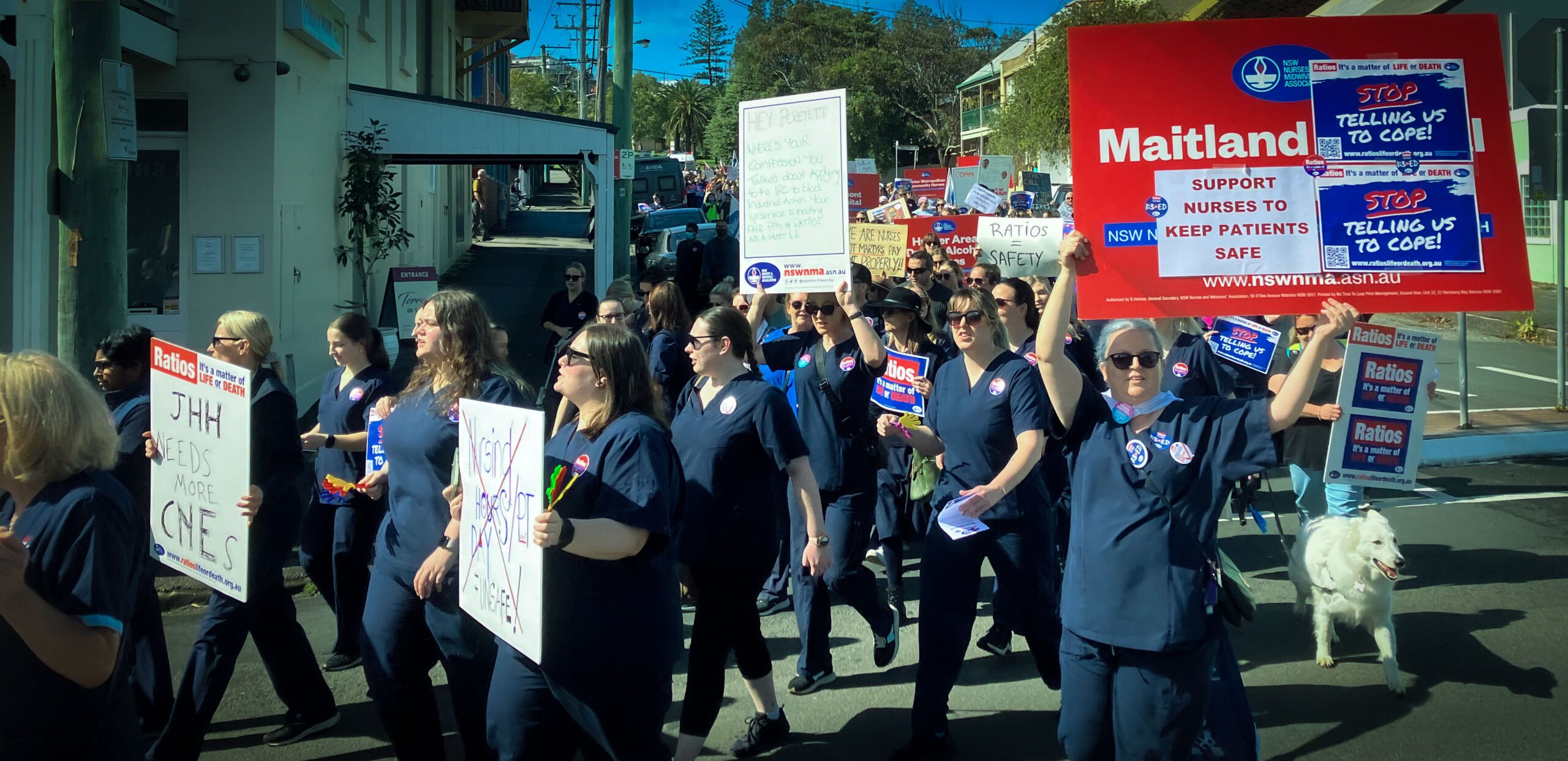The federal Liberal and Nationals policy of further deregulating funding to nursing homes means tens of thousands of NSW aged care nurses face reduced pay under a Coalition government, the NSW Nurses and Midwives Association (NSWNMA) said today.
Tony Abbott and the Federal Coalition have said they will do away with the current wage supplement, which provides increased pay for aged care nurses and other staff through workplace agreements, and provide the funds to aged care operators with no strings attached. (See article below.)
NSWNMA assistant secretary, Judith Kiejda, said this is a return to the disastrous Howard Government policies, which saw hundreds of millions of dollars given to nursing home operators for wage increases, but very little flowed through to the nurses.
“There has to be a mechanism for ensuring the nursing home owners actually give the money to the nurses, otherwise they just hang on to it for themselves. We have seen it before. Assistants in nursing in aged care are already about $70.00 per week behind their public hospital counterparts and many registered nurses are earning up to $200.00 per week less than they can earn at nearby hospitals.
“Twenty years ago aged care nurses were paid the same as hospital nurses, but the Howard Government’s first round of deregulation saw these massive pay gaps open up and, through the Federal Government’s pay supplement and enterprise bargaining we have started to get better pay for aged care nurses again.
“Tony Abbott’s aged care policy will set all this back and tens of thousands of NSW aged care nurses face pay reductions as a result. Tony Abbott’s policy puts profits before resident care. It is about the perceived needs of business, not the needs of residents and nurses.
“The plan to further deregulate the aged care sector also has implications for the quality of resident care. It was shortly after the Howard Government’s first round of deregulation in the late 1990s that serious care quality issues became a public scandal. A certain amount of reregulation was introduced, including spot checks, but there are still serious staffing and quality concerns across the aged care sector.
“Mr Abbott can try and pretend otherwise all he likes, but the reality is many aged care providers focus on their commercial interests and lose sight of why they are funded and why they are allowed to charge residents fees and bonds. A significant number do whatever they can to minimise their labour costs, even if this means compromising the skill mix of staff or reducing the nursing hours provided.
“Most private nursing home operators have been reducing nurse numbers and hours in their facilities since the Howard Government deregulated the sector in the late 1990s. The nurses in the sector do a great job, but there just aren’t enough of them and they have been financially undervalued for too long now. The skills mix is also often inadequate in nursing homes because of these nursing shortages in aged care.
“In 2011, a NSW coroner noted the staffing implications of this deregulation and expressed concern that ‘there are no government guidelines or recommendations as to staff numbers, particularly overnight. There are no guidelines as to patient to carer ratio’. The NSWNMA has consistently argued that this is appalling and unacceptable public policy.
“We must get the policy balance right in aged care otherwise residents and nursing staff all lose. Linking the pay supplement to enterprise bargaining is important to ensuring money meant for nurses actually gets to the nurses. And we must have policies and rules that ensure residents get the highest quality care. Aged care policy must always put residents before profits,” Ms Kiejda said.
Easier regime for aged care
Australian Financial Review, Australia by Joanna Heath
31 Aug 2013
General News – page 5
The Coalition will announce an ambitious policy to reduce regulation of the aged-care sector next week and will consider rewriting the Aged Care Act completely, a leaked document says. In correspondence sent to the office of the Coalition’s spokesperson for mental health and ageing, Concetta Fierravanti-Wells, an adviser to Opposition Leader Tony Abbott describes the draft policy as an expansion of previously announced policies.
The document, which is uncosted as a whole, re-announces a 2010 promise to negotiate a four-year aged-care provider agreement with the sector, which includes retirement villages and nursing homes. The policy also has 20 measures to reduce red tape.
The agreement seeks to provide the sector with certainty over time that regulations and funding arrangements will not be renegotiated at short notice and aims to portray a Coalition government as more consultative than Labor.
The policy document says the negotiation of the agreement, which would begin from July 2014, would include public and private aged-care providers, patient advocacy bodies and the Australian Medical Association as well as religious and not-for-profit providers.
It describes the agreement as “the most comprehensive of its kind akin in scale to the Pharmacy Agreement with the Pharmacy Guild or the memorandum of understanding the government has with Medicines Australia”.
Key ways to reduce red tape include reducing complexity of approval rounds for new facilities, eliminating different state and federal ways of assessing new residents and merging them into one, extending accreditation periods for long-time providers with a good record, and eliminating duplication in federal, state and local government reporting requirements. The final proposal is “changing or rewriting the Aged Care Act”.
“As part of our negotiations for a four-year agreement with the sector, the Coalition will give consideration as to whether the terms of the agreement will require amendment to the Aged Care Act or whether it may even be easier to start afresh with a rewrite of the act,” the document states.
The draft policy would be a win for the fast-growing sector and its main players, including Bupa, Catholic Health Australia and UnitingCare Australia. It may be seen by aged-care patient advocates as a disappointment.
Although the draft policy package as a whole is uncosted, separate information on policy costings seen by the AFR Weekend show the Coalition has worked to drastically scale down the cost of its 2010 election aged-care policy from $935 million to less than $200 million for this campaign.
As of late last year, the Coalition was planning to keep proposals for a bed incentive program worth $335 million to increase the number of aged care beds and $300 million for a convalescent care program.
It also proposed that funding for a day-respite-care program be halved from $20 million to $10 million and separate dementia programs be rolled into the $268 million allocated to tackling the disease within the government’s Living Longer Living Better package.
The Coalition has already committed $200 million for dementia research this campaign.
There is a large amount of bipartisan agreement on the government’s $3.7 billion Living Longer Living Better aged-care policy which was passed by Parliament this year.
In the Coalition position paper leaked to AFR Weekend. MPs are advised to “criticise but support” several measures of the package, including means-testing arrangements and an increased user-pays system.
The only part of the government changes the Coalition has flagged may be under review is the workforce compact, which requires employees to sign up to enterprise bargaining agreements for their employers to receive extra government funding.
On Friday, Mr Abbott and Senator Fierravanti-Wells unveiled the Coalition’s mental health policy. They pledged $18 million to establish a national centre for excellence in youth mental health and a review to assess existing mental health programs.
In a Coalition government, Senator Fierravanti-Wells would lose her current portfolio, with Michaelia Cash, a senator from Western Australia, taking aged care and Victorian MP Josh Frydenberg taking mental health, according to sources.







